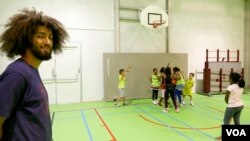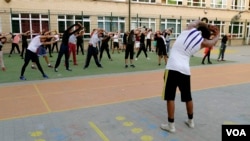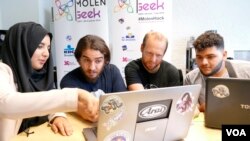Learning how to build apps, hike in the mountains or expand creative skills such as printing T-shirts are just some of the projects organized for young people in Molenbeek, home to one of the largest Muslim communities in Brussels.
Located across a canal from the Belgian capital's city center, the historically working-class neighborhood captured the world's attention last year when it was revealed that those involved in the November terrorist attack in Paris, and the March attack in Brussels, were linked to the borough. Of the estimated 540 Belgians who traveled to the Middle East to fight for extremist groups, 47 are said to have come from this small enclave.
While most Molenbeek residents are tired of discussing Islamic radicalization, many believe that getting youngsters involved in sports and neighborhood projects is important to discouraging extremism.
Something to focus on
Nabil Fallah, a 22-year-old student who first became involved with neighborhood projects at age 15, is now an active Molenbeek volunteer, providing kids with basketball lessons and helping to organize an annual talent show and summer camps.
Fallah says it is important that young people be involved in activities, with the neighborhood's unemployment rate at 40 percent.
“When you don’t have anything to do and are bored, you will start trying things that are not allowed and get into the criminal world," he said. "And when you get in too deep, you can’t come back. Youth projects are important to give you something to do and focus on."
Youth unemployment, school dropout and poverty rates are high in this area. To make sure the activities and classes are affordable for everyone, they are often free of charge or offered for a small fee.
Teaching structure, values and respect
Among the few organizations that cater to people in their late teens and 20s is the Brussels Boxing Academy, whose 550 members draw largely from impoverished neighborhoods such as Molenbeek. Despite the academy’s strong focus on social activities, five members traveled to Syria to become jihadi fighters.
Trainer Tom Flachett believes that the boxing club is the last link with society for some members and that sport can teach youth structure, values and respect. He says the trainers spend a lot of time giving special attention to those who might need it.
“They might have dark thoughts or are struggling with themselves or society, or maybe they’re creating problems in the neighborhood, doing illegal things or not getting along in school, or isolating themselves," he said. "For them, we develop some activities to work on their personality and try to help by solving concrete issues they’re facing.”
Despite organizing several boxing community projects, from theater plays to camping trips, Flachett and the other trainers do not have a background in social work and never received any support for their projects. They have now asked the city of Brussels for a trained professional to assist the academy.
One project has been given financial support from the Belgian federal government and tech companies such as Google in the wake of the terrorist attacks.
Offering ‘hope for the future’
For Ibrahim Ouassari, who dropped out of school when he was 13, the path to a brighter future required taking his own initiative. As a self-trained IT entrepreneur, he started the MolenGeek project in 2015, a place where youngsters are introduced to entrepreneurship and technology.
His own background, he hopes, can help inspire others.
“I am a role model for these youngsters, because I am from here," he told VOA. "A lot of people here in Molenbeek, they don’t have hope for the future. It’s important to give people perspective and hope. People from Molenbeek are conditioned to become a taxi driver, not conditioned to be the next Mark Zuckerberg. Making the world of technology accessible to young people gives them a goal and a future.”
The Belgian government promised to spend $450 million to fight extremism this year.
Karolien Ory, who has been a street corner worker in Molenbeek for more than 10 years, says it’s disappointing that none of that money will be spent on education, social work or neighborhood projects.
“All the money is going to repression," she said. "For the last 10 years, as we have been repeating, the gap between rich and poor is growing and more kids here are growing up in poverty. Investing in the neighborhood could improve the overall well-being and identity development for the young people here.”






